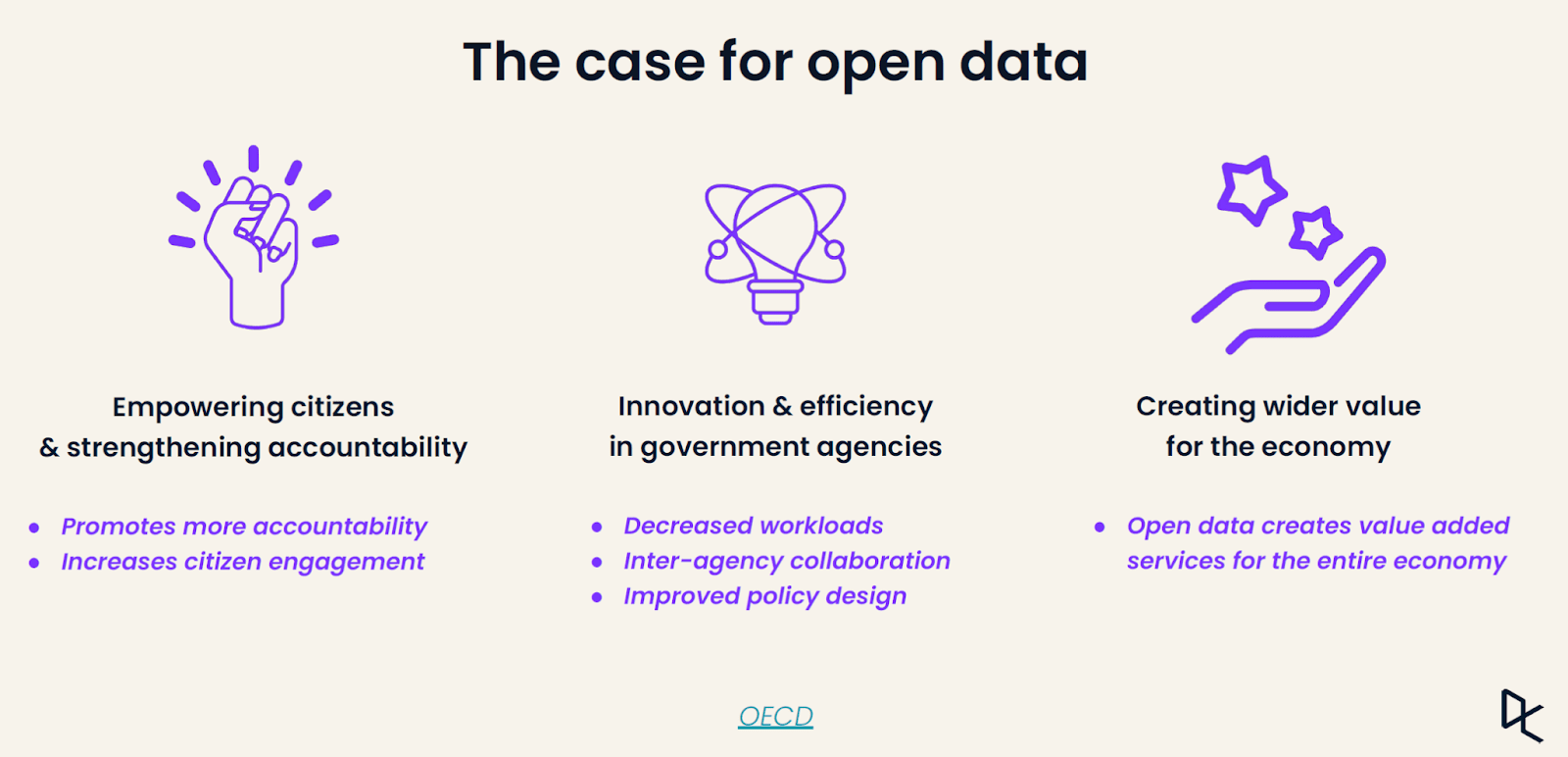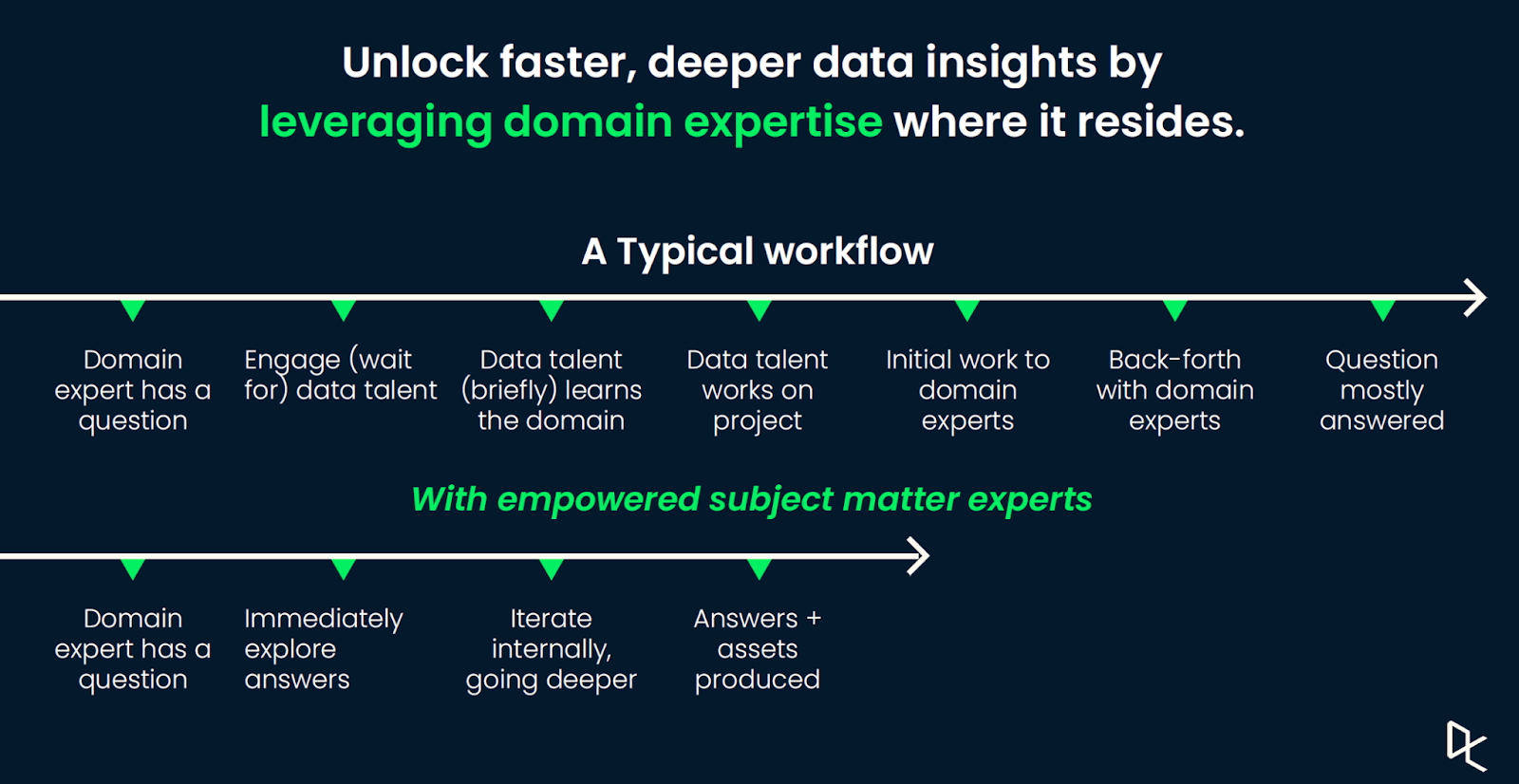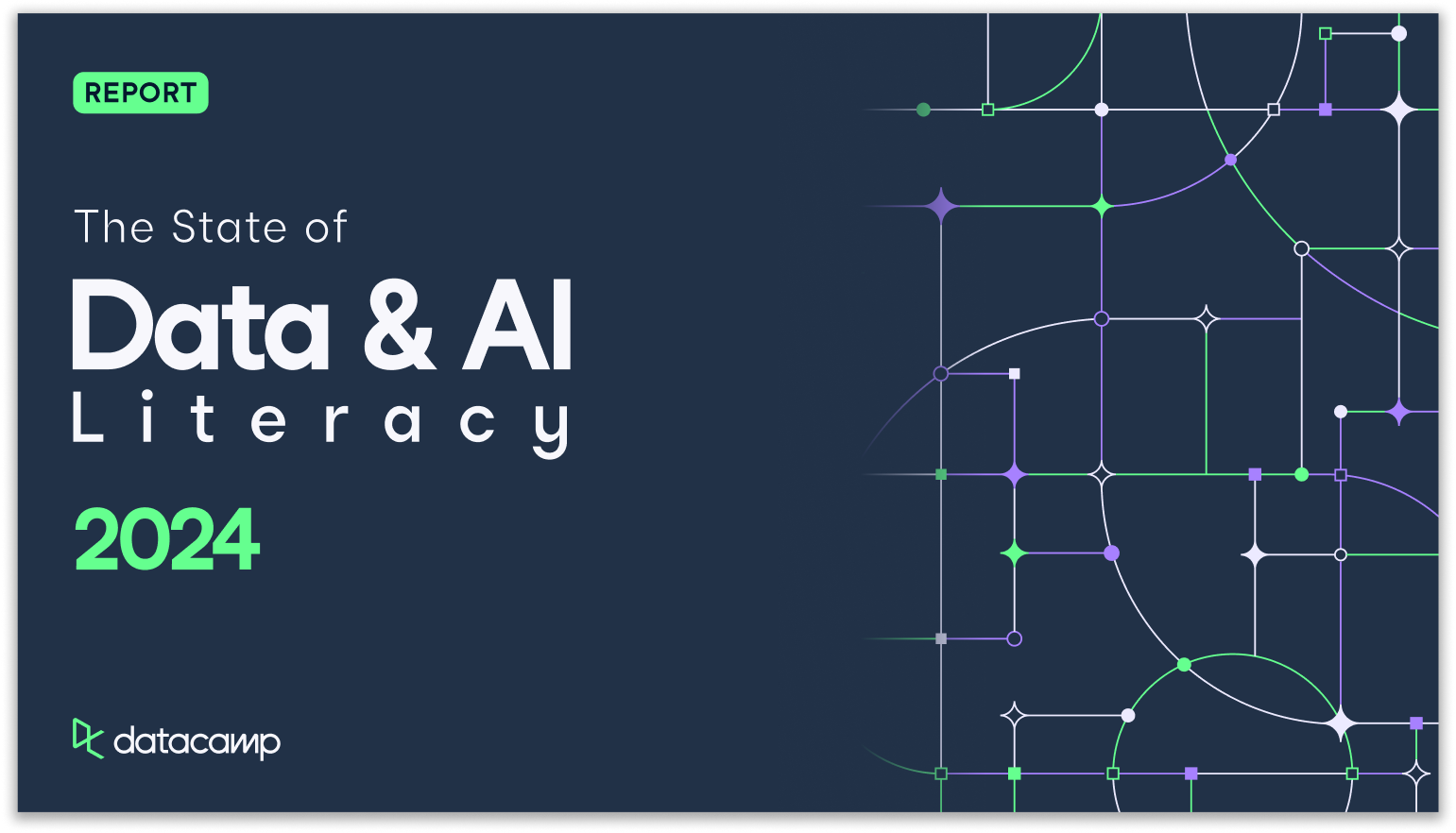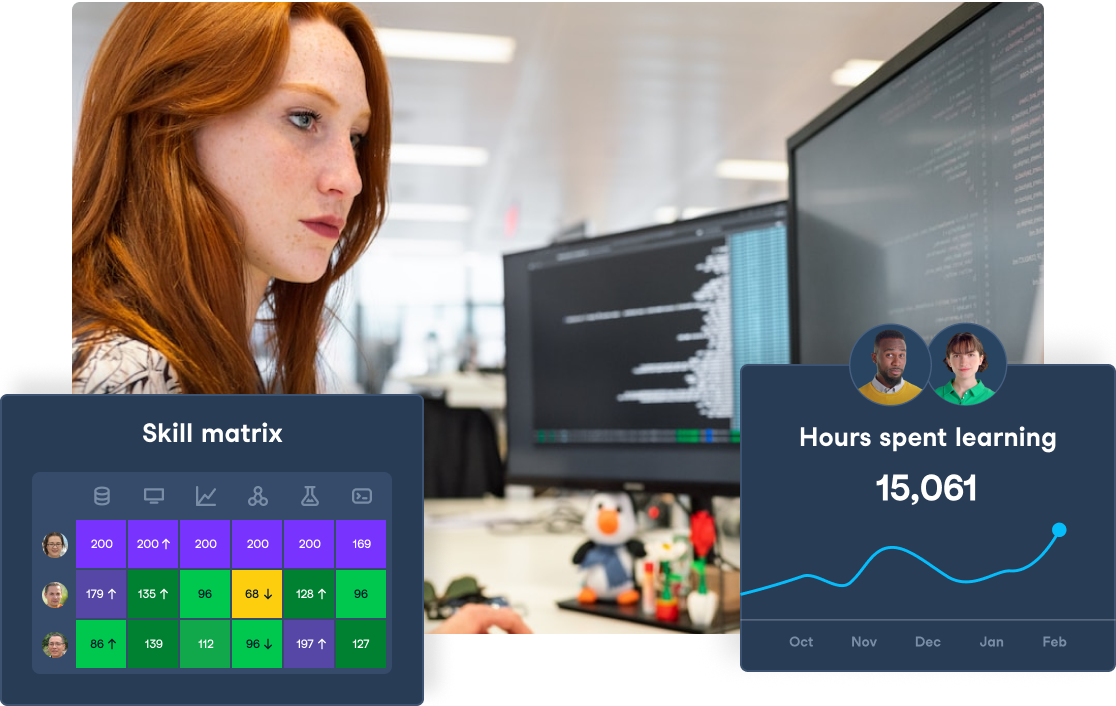Data is a vital asset in today's digital world, and it's changing the way we live, work, and interact with each other. However, for a long time, data was only accessible to a privileged few with the resources and technical know-how to collect, process, and analyze it. This created a significant gap between those with access to data and those without, resulting in unequal access to opportunities and resources.
Democratizing data is about breaking down these barriers and making data more accessible to everyone. It empowers individuals, businesses, and communities to use data to make informed decisions, drive innovation, and create positive social impact. Here, we explore what democratizing data means, why it's important, and how you can achieve it. While we’ll focus mainly on democratizing data in an organizational context, we’ll also touch on its wider implications. You can also read our whitepaper on democratizing data science in your organization to learn more.
Training 2 or more people?
What is Data Democratization?
Data democratization is the process of making data more accessible to a wider range of people within an organization or society. It involves breaking down barriers that prevent people from accessing, analyzing, and utilizing data effectively. Data democratization aims to empower people to make informed decisions and take action based on data insights.
Traditionally, data access was limited to a select group of individuals, such as data analysts or IT professionals. This lack of inclusivity created a power imbalance where decisions were made by a few people with access to data rather than by the broader group of stakeholders who could benefit from it. With data democratization, this power imbalance is challenged, and data becomes more accessible to a wider range of people, including decision-makers, front-line workers, and customers.
Data democratization involves not only making data accessible but also making it understandable and actionable. This means providing people with the tools and skills they need to analyze and interpret data effectively. It also involves creating a culture of data literacy within organizations and communities, where people are encouraged to use data to inform decisions and drive innovation. These factors are at the heart of DataCamp’s mission as we bring data education to individuals and organizations.
Democratizing Data in Organizations
In a business sense, data democratization is the practice of providing data access to everyone in an organization. This means empowering every team member to access and use data for informed decision-making without requiring technical expertise or IT intervention.
Data democratization enables self-service analytics, where non-technical employees can leverage data to gain insights, make decisions, and explore data patterns. This practice is not limited to structured data but includes unstructured and dark data as well.
Democratizing data means that more people have access to and can interpret enterprise data.
Beyond organizations, data democratization also encourages data transparency in governments and institutions, which motivates citizens to access and use the data available openly. Read more about democratizing data in government agencies in a separate article.

The Benefits of Data Democratization
We can turn to our State of Data Literacy Report 2025 for more insight on the benefits of democratizing data. It’s a concept that can benefit both individuals and organizations
by solving problems and creating value. Here are some of the key benefits:
Improved data literacy
If we consider data literacy as a key part of data democratization, we see that the vast majority of business leaders found that employees equipped with data literacy skills outperformed those without the same fundamental data skills. It also equips individuals with the skills they need to navigate the data-driven world we live in today.
A more productive workforce
Similarly, our report found that 70% of leaders engaged in data upskilling have experienced more than 70% improvement in quality and speed of decision-making, innovation, customer experience, and employee retention. From a business perspective, we can see that data democratization can make for a more skilled workforce that is more efficient and innovative.
A good example of this data democratization in action is the Allianz case study. Using DataCamp, Allianz upskilled more than 6,000 people on a range of data skills. They created 22 personalized learning paths for different learners, tied learning goals to business goals, and were able to measure a 1.9 hours average time saved per week for each upskilled employee.
More value for individuals
Individuals can also benefit from data democratization. 77% of business leaders agreed they would pay a salary premium to candidates with data literacy skills. Encouraging equal access to data gives employees a chance to learn and refine such skills, thus making them feel valued and adding value to their careers.
Greater transparency
Data democratization can promote greater transparency and accountability within organizations, as more individuals can access the same data and verify and validate findings, encouraging openness and innovation.

Data Literacy and Data Democratization
The link between data democratization and data literacy is clear. To truly democratize data and make it accessible to a wider range of people, those individuals must have the necessary skills and knowledge to understand and effectively use that data. This means investing in education and training programs to improve data literacy across an organization and ensuring that data is presented in a way that is clear and easy to understand.
By promoting data democratization and data literacy together, organizations can ensure that everyone has access to the information they need to make informed decisions and drive positive change. This can lead to increased transparency, accountability, and innovation, ultimately resulting in better outcomes for everyone involved.
Download the State of Data & AI Literacy Report 2024
Uncover what 550+ leaders in the US & UK believe about the state of their teams’ data & AI skills.

The Challenges of Data Democratization
Of course, democratizing data sounds good on paper, but making it a reality can be somewhat challenging. One of the main hurdles is that data is often siloed and has unclear ownership. Furthermore, an organization's lack of data literacy can potentially lead to misinterpretation or bad decisions.
Ensuring data quality, integrity, and security is a major concern that needs to be addressed in the process of making data accessible. Another challenge is the shortage of data scientists to support data democratization. Let’s look at the challenges in more detail:
- Data access. One of the biggest challenges of data democratization is ensuring that all individuals and teams within an organization have access to the data they need when they need it. This requires a robust infrastructure that can handle large volumes of data and provide quick and easy access to authorized users.
- Data quality. Another challenge is ensuring the data is accurate, reliable, and up-to-date. This requires a system of checks and balances to ensure that data is consistently entered and verified, and that data sources are properly integrated and maintained.
- Data governance. Organizations need to establish clear policies and guidelines for data access and usage to prevent data misuse. This includes defining who has access to which data, how data is stored and protected, and how data can be used in decision-making processes.
- Data privacy. Data democratization can also raise privacy concerns as more individuals gain access to sensitive data. Organizations need to establish protocols for protecting sensitive data, such as anonymization, encryption, and access controls.
- Data culture. Finally, data democratization requires a cultural shift within an organization to embrace data-driven decision-making. This requires educating employees on how to use data effectively and fostering a culture of transparency and collaboration around data. You can read more about how to create a data-driven culture in a separate article.
Discover more about avoiding pitfalls in data democratization with our webinar on the subject, exploring common pitfalls, best practices in building data cultures, and tactical insights for driving the adoption of data and analytics.
Strategies for Successful Data Democratization
According to research by Adobe, data democratization is essential as it solves resource shortages and decreases bottlenecks. Hence, it has become an essential strategy for various organizations. But how can you deliver on data democratization initiatives in your organization?
Best practices for data democratization include offering training and support, establishing clear guidelines, and providing tools for data analysis. When data is democratized effectively, it puts it into the hands of those who can use it best, empowering them to make informed decisions that benefit the organization. Let’s look at these strategies in more detail:
Offer training and support
One key strategy for successful data democratization is to offer training and support to employees at all levels of the organization. This includes providing education on how to use data analysis tools and techniques, as well as offering support and guidance on data-related issues. By investing in employee training and development, organizations can build a culture of data literacy and empower individuals to make informed decisions based on data insights.
Establish clear guidelines
Another strategy for successful data democratization is establishing clear data access, usage, and governance guidelines. This includes defining roles and responsibilities for data management, establishing policies for data security and privacy, and outlining procedures for data sharing and collaboration. By setting clear expectations and guidelines, organizations can ensure that data is being used appropriately and responsibly, and that employees understand their role in the data democratization process.
Provide tools for data analysis
A third strategy for successful data democratization is to provide employees with the tools they need to analyze and interpret data effectively. This includes investing in data analytics platforms and software, as well as providing access to data visualization tools and dashboards. By providing employees with easy-to-use tools for data analysis, organizations can facilitate data-driven decision-making and empower individuals to leverage data in their day-to-day work.
Encourage collaboration and knowledge sharing
To fully realize the benefits of data democratization, it is important to foster a culture of collaboration and knowledge sharing within the organization. This can involve setting up cross-functional teams to work on data projects, establishing forums and communities of practice for sharing insights and best practices, and providing incentives for individuals and teams to collaborate and share their findings. By promoting collaboration and knowledge sharing, organizations can maximize the value of their data assets and enable more effective decision-making across the organization.
Tools for Data Democratization
Best practices for democratizing data allow non-technical users to gather and analyze data without requiring IT help.This means giving everyone within an organization the chance to make data-informed decisions.
There are a range of tools that can help to democratize data in an organization. We’ve listed a few such tools below:
- Data visualization tools. These tools help users to visualize data in an easy-to-understand way. They can help to democratize data by making it accessible to a wider range of people who may not have extensive data analysis skills. Some examples of data visualization tools include Tableau and Power BI.
- Open data platforms. These platforms provide access to data that is publicly available, allowing anyone to access and use the data for their own purposes. Examples of open data platforms include Data.gov, the Open Data Initiative, and the World Bank's Open Data Portal.
- Data catalogs. Such catalogs provide a searchable index of available data sets, making it easier for users to find and access the data they need. Data catalogs can be used to democratize data by providing a central repository for data that is accessible to all members of an organization or community. Some examples of data catalog tools include CKAN, Socrata, and OpenDataSoft.
- Data governance tools. Tools for data governance help organizations to manage and protect their data assets, ensuring that data is accurate, secure, and compliant with relevant regulations. In addition, data governance tools can support data democratization by providing a framework for sharing data in a controlled and secure manner. Examples of data governance tools include Collibra, Alation, and Informatica.
- Self-service analytics tools. These tools enable users to perform data analysis tasks on their own without relying on IT or data science teams. Self-service analytics tools can support data democratization by giving users the power to access and analyze data independently.
Of course, DataCamp for Business is another valuable tool in the democratization of data. DataCamp can help your team develop data skills using the deepest learning curriculum in the industry, including Python, SQL, R, Power BI, Tableau, and Data Literacy.
You can discover more about how data discovery tools enable data democratization in a separate article.
The Future of Data Democratization
As we’ve seen with the recent developments in generative AI, such as GPT-4, data will only become more central to our daily lives. As such, every individual or organization that requires access to data should have it at their fingertips.This means that organizations must find ways to make data more accessible and usable to a wider range of stakeholders.
To continue the data literacy revolution, we’ll need to see further investments in data infrastructure, governance, and culture, as well as new tools that can facilitate data analysis and collaboration.
However, with such developments will come concerns around data privacy and security. As such, organizations will need to balance data democratization with the protection of sensitive information.
And, of course, those who invest in data democratization and data upskilling are likely to fare better than those who do not. As we saw in the State of Data Literacy Report, 67% of data and business leaders believe that organizations that invest in data upskilling are more likely to be recession-proof. Similarly, 85% percent felt that countries investing in data literacy skills will outperform those who are not.
Conclusion
The future of data democratization is a promising one, as it’s becoming increasingly vital for companies to empower employees with access to the right data, tools, and resources. This allows them to make data-driven decisions that can boost performance and improve business results. While it’s certainly not a simple process, it’s well worth it in the long run.
Here are some tips to help you start data democratization: First, define what data democratization means to your organization and create a plan around it. Then, educate employees on the concept of data democratization and its benefits and help them understand how it can benefit their own performance. Lastly, provide ample training and resources so everyone can access data easily and perform better. For industry-leading education, DataCamp for Business can help your organization upskill effectively and at scale.
Training 2 or more people? Check out our Business solutions
Get your team access to the full DataCamp library, with centralized reporting, assignments, projects and more
